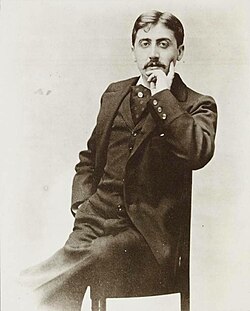Marcel Proust Quote
Sometimes, as Eve was born from one of Adam’s ribs, a woman was born during my sleep from a cramped position of my thigh. Formed from the pleasure I was on the point of enjoying, she, I imagined, was the one offering it to me. My body, which felt in hers my own warmth, would try to find itself inside her, I would wake up. The rest of humanity seemed very remote compared to this woman I had left scarcely a few moments before; my cheek was still warm from her kiss, my body aching from the weight of hers. If, as sometimes happens, she had the features of a woman I had known in life, I would devote myself entirely to this end: to finding her again, like those who go off on a journey to see a longed-for city with their own eyes and imagine that one can enjoy in reality the charm of a dream. Little by little, the memory of her would fade, I had forgotten the girl of my dream.
Sometimes, as Eve was born from one of Adam’s ribs, a woman was born during my sleep from a cramped position of my thigh. Formed from the pleasure I was on the point of enjoying, she, I imagined, was the one offering it to me. My body, which felt in hers my own warmth, would try to find itself inside her, I would wake up. The rest of humanity seemed very remote compared to this woman I had left scarcely a few moments before; my cheek was still warm from her kiss, my body aching from the weight of hers. If, as sometimes happens, she had the features of a woman I had known in life, I would devote myself entirely to this end: to finding her again, like those who go off on a journey to see a longed-for city with their own eyes and imagine that one can enjoy in reality the charm of a dream. Little by little, the memory of her would fade, I had forgotten the girl of my dream.
Related Quotes
Sitting in a corner, I live like a toad Oh! How I love my room: my tiny abode! Here I wake up; and I sleep in hereThe world far away; yet virtually near Not that I'm jailed in this place of graceJust...
Your clock cannot buy you more time, your bed cannot get you more sleep, your titles cannot acquire you more influence, your fame cannot gain you more honor, and your money cannot earn you more happin...
About Marcel Proust
Proust was born in the Auteuil quarter of Paris, to a wealthy bourgeois family. His father, Adrien Proust, was a prominent pathologist and epidemiologist who studied cholera. His mother, Jeanne Clémence Weil, was from a prosperous Jewish family. Proust was raised in his father's Catholic faith, though he later became an atheist. From a young age, he struggled with severe asthma attacks which caused him to have a disrupted education. As a young man, Proust cultivated interests in literature and writing while moving in elite Parisian high society salons frequented by aristocrats and the upper bourgeoisie. These social connections provided inspiration and material for his later novel. His first works, including the collection of stories Les plaisirs et les jours, were published in the 1890s to little public success.
In 1908, Proust began work on À la recherche du temps perdu. The novel consists of seven volumes totaling around 1.25 million words and featuring 2,000 characters. It explores themes of memory, art, love, High Society and the human experience through the narrator's recollections. Begun when Proust was 38, the novel was partially published in his lifetime, with the initial sections appearing in 1913. The remaining volumes were revised and published posthumously by his brother Robert based on drafts and proofs. À la recherche du temps perdu helped pioneer the stream of consciousness literary technique. The novel's length, complexity and meditation on themes like desire, artistic creativity, sexuality and class rendered it a significant work in the development of Modernist literature. The work was translated into English by C. K. Scott Moncrieff and others.
Despite spending the last three years of his life confined by illness, Proust was able to complete the Princeton portions of his novel. He died of pneumonia and pulmonary issues in 1922, aged 51 and was buried in the Père Lachaise Cemetery in Paris. Proust's sexuality and relationships with men were an open secret among his social circles, though the author himself never publicly acknowledged being homosexual.
